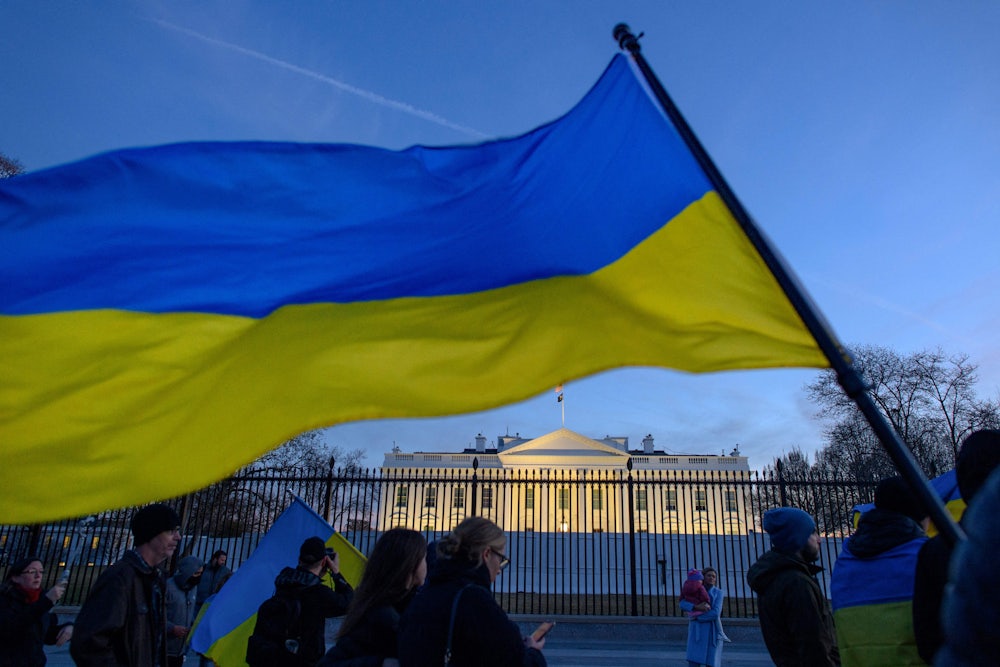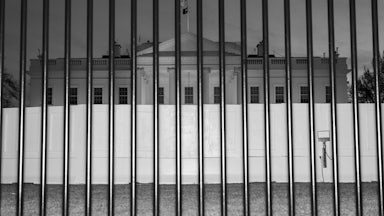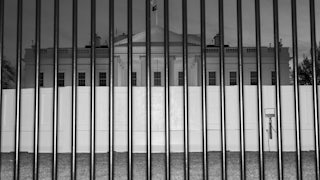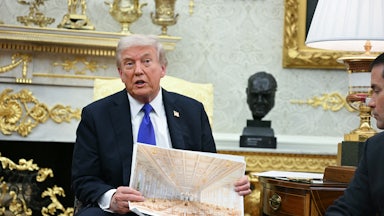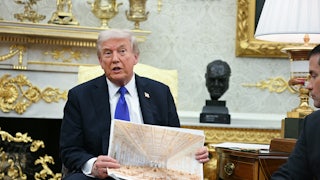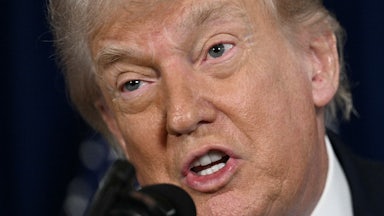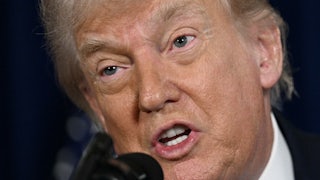Russia’s recent invasion of Ukraine is shaping up to be a seminal moment in the history of American foreign policy. Like many events before it—the war in Vietnam, the Cold War, the invasion of Iraq—this crisis will have the chance to determine the way the United States understands its role in the world. Is the U.S. still playing post–Cold War superpower, as if it can dispatch its military at a moment’s notice to force other countries into globalism and openness? Or have the failed military interventions in Iraq, Afghanistan, and Libya finally dampened Washington’s enthusiasm for trying to control the world?
Perhaps most importantly: If the U.S. has given up on liberal internationalism, what are we replacing it with? As right-wing pundits embrace isolationism for their own nationalist, nihilistic reasons, how can the left articulate what caring about human rights and democracy looks like without sending the military to enforce them?
“Already before the Russian invasion of Ukraine, this was a moment where a lot of the … consensus had really clearly broken apart on foreign policy,” says Matt Duss, foreign policy adviser to Senator Bernie Sanders. “Trump’s election made that clear on a lot of policy issues. And a lot of the so-called consensus was actually not very deeply rooted.”
Since Russia’s invasion began, in late February, this break has only become more obvious. The splits within and between both political parties are stark, and each faction within the larger American foreign policy debate has struggled to navigate a tricky landscape.
For the American progressive left, this is a particularly important moment: Critical questions are being asked, and answering them successfully could create an opening for an imaginative rethinking of U.S. foreign policy after two decades of post–Cold War unipolarity and four years of reckless, “America First” Trumpism. Given the American public’s lack of appetite for war—with Russia but also more generally, America’s time as a “global hall monitor” may be coming to an end. But in this particular case, the U.S. can be a voice for good and support in practice what so many, including Joe Biden, have rhetorically advocated for: a reorienting of American foreign policy around diplomacy and increased, consistent concern for human rights and democracy (as opposed to picking and choosing when to support democracy and when to ally with autocratic regimes).
The process is not an easy one. For starters, those who promoted the old ideas still linger in Washington. And they haven’t given up on seizing this moment for their own ends. “The response to Ukraine has in some ways heightened that [debate] and, in some ways, I think, invigorated some of the establishment voices,” says Duss. “But I think it’s also invigorated those of us who are trying to promote a different, less militaristic but no less robust vision of America’s role in the world.”
On the one side, Russia’s imperialist ambitions have energized some of the most hawkish voices in D.C.—those who constantly agitate for the American government to “do something”—which, in this particular case, appears to mean imposing a no-fly zone over Ukrainian airspace or otherwise taking steps that risk escalating the conflict and pushing all of the agitants down a dangerous path with no clear endgame. Many of these same voices have tarred those who have sought a more cautious approach with a slew of derogative epithets: They’re either obstinate isolationists or outright apologists for Putin, enemies of democracy.
“One of the things that drives me really crazy when it comes to a lot of these debates is that progressives can get labeled as isolationists or that ‘we don’t want to do anything,’” Stephen Miles, president of the advocacy group Win Without War, told me, “just because we don’t want to necessarily pursue a direct military engagement, which is often Washington’s first choice.”
But on the other side are those who truly are isolationists, really do apologize for Putin, and don’t particularly value liberal democracy, Tucker Carlson being the most prominent example.
/ In honor of Earth Day, TNR’s climate coverage is free to registered users until April 29. Start reading now.
“Why shouldn’t I root for Russia [in the conflict with Ukraine]? Which I am,” Carlson asked a guest during an interview back in 2019. More recently, in the lead-up to the invasion, the Fox News host wondered, “Why is it disloyal to side with Russia but loyal to side with Ukraine? They’re both foreign countries that don’t care anything about the United States. Kind of strange.”
As the journalist Peter Beinart wrote in The New York Times, in late March: “Mr. Carlson [has] identified a genuine problem: the corruption and lack of accountability that plague American foreign policy,” in his criticism of the U.S. approach to the war in Europe. But the left must find a way to acknowledge and address that problem, while simultaneously articulating a passion for democracy and pushing back against the ostensibly anti-intervention but pro-authoritarian wing of the GOP.
The mission hardly ends there, however. The left must also successfully manage to disentangle the short-term culpability for the invasion, which rests squarely on the shoulders of the Russian president, from the long-term causes of the crisis. Here, Russia clearly had a role, but the West had a hand in it as well, with the dangling possibility of NATO expansion looming over the post-Soviet space, to say nothing of the U.S. role in the 2014 Ukrainian revolution. Critics from both the establishment and the left tend to obfuscate these matters; where the former sees the war as an inevitable act by an authoritarian Putin, some on the left have allowed their opposition to the American foreign policy apparatus to hinder their ability to criticize Russia.
In the aftermath of the disastrous wars in Iraq and Afghanistan, camps within both the American left and right have advocated for a foundational rethinking of the way the U.S. understands its role in the world. At its most basic, the split featured a combination of libertarians and anti-war progressives both combating their respective party’s foreign policy establishment: neoconservatives on the right and liberal internationalists on the left. “There’s been a tactical alliance, or alliance of convenience, between factions of the libertarian right and the left going back to the Iraq War days and some of the opposition from Ron Paul and others,” explains Miles. “But there’s always been an understanding that we also had deep, deep disagreements and deep differences on certain issues.” While the two sides often differed in their approach, both opposed the militarism and reflexive interventionism that reigned in Washington, D.C., following the Cold War.
In recent years, that tactical coalition has won some important victories, the most notable being the August 2021 withdrawal from Afghanistan, a process that started under Republican President Trump and was carried out by his Democratic successor.
During the crisis in Ukraine, Biden has so far maintained what Duss called on Twitter a “responsible progressive position,” resisting calls to, among other things, impose a no-fly zone over Ukraine.
But the invasion has also illuminated the limits of such a coalition. “There is a ceiling on the cooperation on some very foundational issues for progressives,” Duss told me: “Like human rights, like promoting democracy, like climate change, like anti-corruption. Those are very, very key issues, I think, for progressives.” These issues are indelibly tied up with the Russo-Ukrainian conflict. This is not to suggest that those on the more conservative side of the so-called “restraint” coalition do not value liberal democracy; many do, and many have argued for the same policy prescriptions as the left has since the war started.
America’s advocacy of democracy around the world is a question not only of desire but of ability. As the U.S. has fallen short on its promise to deliver democracy around the world, democracy within the U.S. has eroded along a similar timeline. Our struggle to preserve democracy within our own borders makes us a somewhat inapt avatar of its virtue.
“The reality is, we can’t defend democracy abroad if we aren’t defending our democracy at home, and that’s been, obviously, one of the key failures of what we saw over the last two decades,” says Miles. “They’re unquestionably linked, and that’s key to a progressive approach, understanding interconnections between the domestic and the international.”
Here is where some on the left sense not only that they have been asking the right questions for the last generation but that the Russian invasion of Ukraine can be a test case for a new kind of foreign policy—one that could help refertilize democracy at home and abroad. “I think it is the left that really has the best theory of the case with regard to connecting our domestic politics to our foreign policy and the mutually reinforcing relationship between the two,” says Duss. “It’s great that Biden and his team are out there talking about ‘foreign policy for the middle class,’ but the left has been on this for a long time, understanding that militarism abroad and inequality at home are deeply interconnected.”
The importance of a strong democracy in the U.S is critical: The most powerful way to advocate for democracy abroad is to model it at home and illuminate its uprightness. But it is an equally important ingredient in America’s ability to conduct effective diplomacy and uphold international agreements—these matters hinge on the strength of our political well-being. It’s difficult to imagine that any country would choose to make any type of long-term investment in the U.S. if opposing parties are preemptively undermining these efforts or constantly vacillating between two extremes with every election cycle.
To take but one prominent example: The Obama administration signed the Iran nuclear deal in 2015; Trump unilaterally withdrew from the agreement three years later. Now, four years after that, as the Biden administration negotiates to rejoin the accord, conservative members of Congress are already writing letters announcing that they will support a withdrawal from the so-far nonexistent deal. How do the other parties to these negotiations navigate these inconsistencies? How assured can they be that any long-term commitments we make today won’t be thrown on the scrap heap tomorrow?
In at least the past two decades, catastrophic and deadly wars have been pursued by the U.S. under the guise of so-called “democracy promotion.” When the president frames this issue as an existential battle between democracies and autocracies, and many of the same cheerleaders who urged invasion in Iraq and Afghanistan have advocated for a similarly muscular stance towards Russia, skepticism is a justifiable reaction. But this is a moment when, with the correct approach, the U.S. can be a force for peace and democracy. The question is whether we are truly still capable of such feats.
